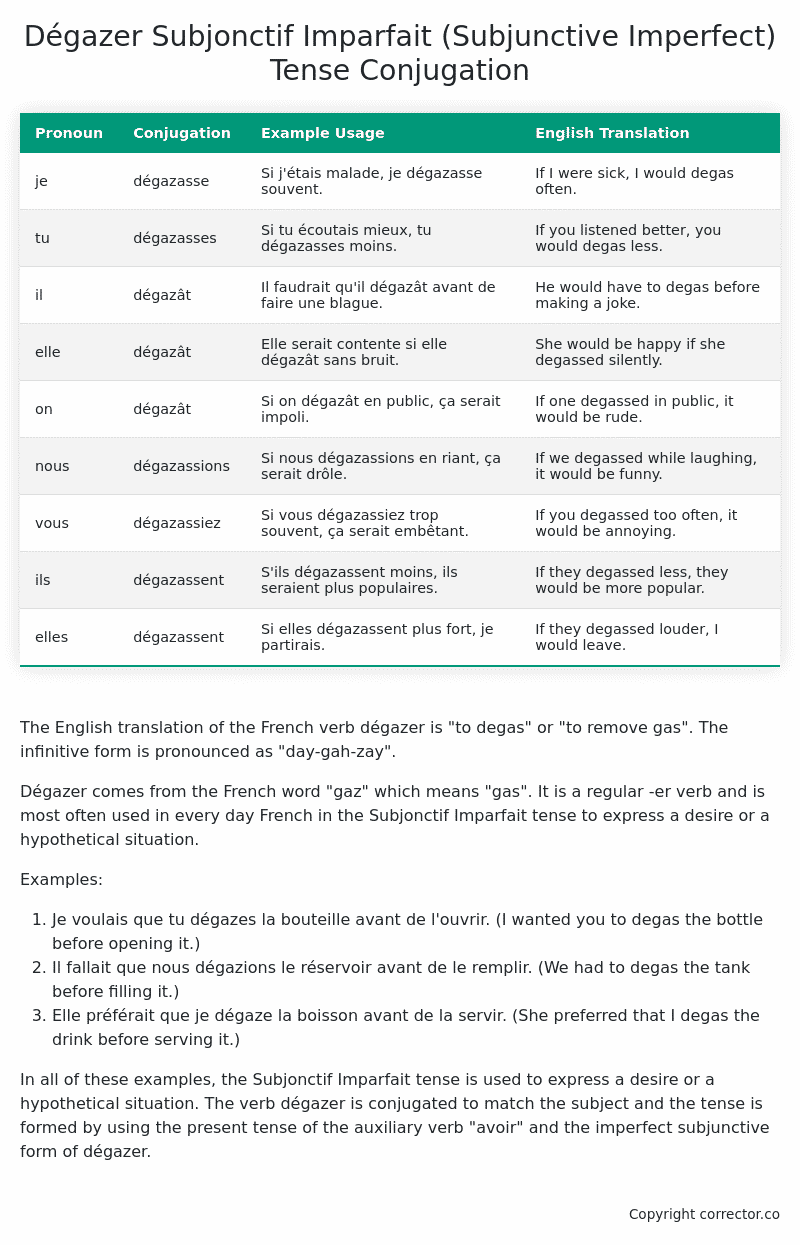Subjonctif Imparfait (Subjunctive Imperfect) Tense Conjugation of the French Verb dégazer
Introduction to the verb dégazer
The English translation of the French verb dégazer is “to degas” or “to remove gas”. The infinitive form is pronounced as “day-gah-zay”.
Dégazer comes from the French word “gaz” which means “gas”. It is a regular -er verb and is most often used in every day French in the Subjonctif Imparfait tense to express a desire or a hypothetical situation.
Examples:
- Je voulais que tu dégazes la bouteille avant de l’ouvrir. (I wanted you to degas the bottle before opening it.)
- Il fallait que nous dégazions le réservoir avant de le remplir. (We had to degas the tank before filling it.)
- Elle préférait que je dégaze la boisson avant de la servir. (She preferred that I degas the drink before serving it.)
In all of these examples, the Subjonctif Imparfait tense is used to express a desire or a hypothetical situation. The verb dégazer is conjugated to match the subject and the tense is formed by using the present tense of the auxiliary verb “avoir” and the imperfect subjunctive form of dégazer.
Table of the Subjonctif Imparfait (Subjunctive Imperfect) Tense Conjugation of dégazer
| Pronoun | Conjugation | Example Usage | English Translation |
|---|---|---|---|
| je | dégazasse | Si j’étais malade, je dégazasse souvent. | If I were sick, I would degas often. |
| tu | dégazasses | Si tu écoutais mieux, tu dégazasses moins. | If you listened better, you would degas less. |
| il | dégazât | Il faudrait qu’il dégazât avant de faire une blague. | He would have to degas before making a joke. |
| elle | dégazât | Elle serait contente si elle dégazât sans bruit. | She would be happy if she degassed silently. |
| on | dégazât | Si on dégazât en public, ça serait impoli. | If one degassed in public, it would be rude. |
| nous | dégazassions | Si nous dégazassions en riant, ça serait drôle. | If we degassed while laughing, it would be funny. |
| vous | dégazassiez | Si vous dégazassiez trop souvent, ça serait embêtant. | If you degassed too often, it would be annoying. |
| ils | dégazassent | S’ils dégazassent moins, ils seraient plus populaires. | If they degassed less, they would be more popular. |
| elles | dégazassent | Si elles dégazassent plus fort, je partirais. | If they degassed louder, I would leave. |
Other Conjugations for Dégazer.
Le Present (Present Tense) Conjugation of the French Verb dégazer
Imparfait (Imperfect) Tense Conjugation of the French Verb dégazer
Passé Simple (Simple Past) Tense Conjugation of the French Verb dégazer
Passé Composé (Present Perfect) Tense Conjugation of the French Verb dégazer
Futur Simple (Simple Future) Tense Conjugation of the French Verb dégazer
Futur Proche (Near Future) Tense Conjugation of the French Verb dégazer
Plus-que-parfait (Pluperfect) Tense Conjugation of the French Verb dégazer
Passé Antérieur (Past Anterior) Tense Conjugation of the French Verb dégazer
Futur Antérieur (Future Anterior) Tense Conjugation of the French Verb dégazer
Subjonctif Présent (Subjunctive Present) Tense Conjugation of the French Verb dégazer
Subjonctif Passé (Subjunctive Past) Tense Conjugation of the French Verb dégazer
Subjonctif Imparfait (Subjunctive Imperfect) Tense Conjugation of the French Verb dégazer (this article)
Subjonctif Plus-que-parfait (Subjunctive Pluperfect) Tense Conjugation of the French Verb dégazer
Conditionnel Présent (Conditional Present) Tense Conjugation of the French Verb dégazer
Conditionnel Passé (Conditional Past) Tense Conjugation of the French Verb dégazer
L’impératif Présent (Imperative Present) Tense Conjugation of the French Verb dégazer
L’infinitif Présent (Infinitive Present) Tense Conjugation of the French Verb dégazer
Struggling with French verbs or the language in general? Why not use our free French Grammar Checker – no registration required!
Get a FREE Download Study Sheet of this Conjugation 🔥
Simply right click the image below, click “save image” and get your free reference for the dégazer Subjonctif Imparfait tense conjugation!

Dégazer – About the French Subjonctif Imparfait (Subjunctive Imperfect) Tense
Formation
Common Everyday Usage Patterns
Interactions with Other Tenses
Subjonctif Présent
Indicatif Passé Composé
Conditional
Conditional Perfect
Summary
I hope you enjoyed this article on the verb dégazer. Still in a learning mood? Check out another TOTALLY random French verb conjugation!


